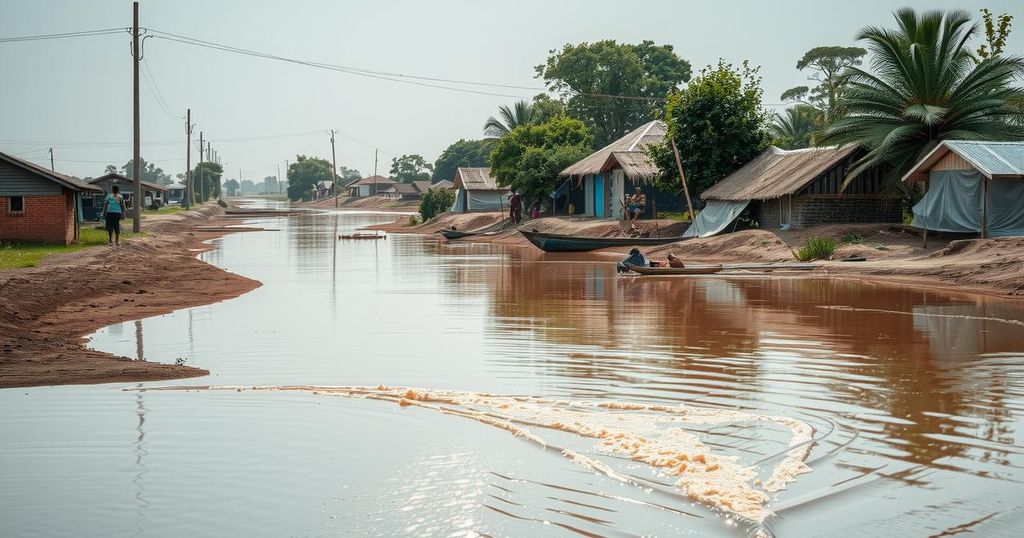Tropical Storm Sara Forms, Threatens Honduras with Catastrophic Flooding
Tropical Storm Sara has formed in the Western Caribbean, threatening Honduras with rainfall totals of 10 to 20 inches, leading to risks of flash floods and mudslides. Despite having favorable conditions for development, land interaction may curtail intensification. The storm’s approach highlights the ongoing vulnerabilities faced by Honduras following catastrophic losses from previous hurricanes and the need for improved climate awareness and preparedness.
On November 14, Tropical Depression 19 developed over the unusually warm waters of the Western Caribbean, quickly evolving into Tropical Storm Sara within a matter of hours. This formation has brought the 2024 Atlantic hurricane season to a total of 18 named storms, surpassing average seasonal totals significantly. As of the latest assessments, Sara had sustained winds of 40 mph and was positioned near the Honduras coast, with projections indicating potential landfall late Thursday. Sara is anticipated to bring substantial rainfall, between 10 to 20 inches, causing extreme flooding risks, especially in northern Honduras. Sara is expected to follow a westward path influenced by high pressure overhead this weekend before veering northward towards the Yucatan Peninsula, according to various model forecasts. Despite the favorable warm waters for potential intensification, land interaction may hinder significant strengthening of the storm. The rugged terrain of Honduras poses additional challenges, prompting severe precipitation and the risk for mudslides and flash floods in the mountainous regions. Previous hurricanes, such as Mitch in 1998 and the more recent Eta and Iota in 2020, have left devastating impacts on infrastructure and local economies, heightening the concerns for communities in the storm’s path. Historical precedents inform the urgency regarding Sara’s potential impacts. Hurricane Mitch resulted in catastrophic damage and loss of life while Eta and Iota exacerbated vulnerabilities, causing billions in damages and displacing many residents. The aftermath of these storms significantly contributed to economic decline and spurred a notable increase in migration from Honduras to the United States, driven by environmental factors linked to climate change. Authorities and organizations emphasize the necessity for improved climate education and preparedness to mitigate future crises, as a notable 77% of residents seek increased awareness on climate issues. The situation remains precarious for Honduras as Tropical Storm Sara approaches, a poignant reminder of the ongoing climate challenges facing the region and the need for systemic change and international support to address both immediate and long-term recovery efforts.
The formation of Tropical Storm Sara in the Caribbean unfolds against the backdrop of an already hyperactive Atlantic hurricane season. With warmer sea surface temperatures contributing to storm intensity, this season marks a notable surge in tropical activity, particularly following a lull in August and September. Honduras, historically vulnerable to hurricanes, is still recovering from the catastrophic impacts of previous storms, which serve as cautionary tales of the potential destruction tropical cyclones can inflict. Furthermore, climate change exacerbates these vulnerabilities, as evidenced by the significant economic and humanitarian challenges resulting from recent hurricanes.
In conclusion, Tropical Storm Sara presents an imminent threat to Honduras, bringing potential for catastrophic flooding and mudslides, aggravated by the region’s historical vulnerabilities to hurricanes. The economic repercussions from past storms serve as a stark reminder of the region’s fragility in the face of climate change. Immediate efforts for disaster preparedness and long-term solutions to address both climate impacts and recovery are crucial. The need for raised awareness regarding environmental issues among the public is paramount, as these challenges are likely to continue intensifying without comprehensive strategies.
Original Source: yaleclimateconnections.org




Post Comment